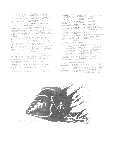 this sort of quasi-religious feeling in 'Flight to Arras', where his own feelings as a fighter pilot are an example of a type of self-realization in extremis : "Your true significance becomes dazzlingly evident. Your true name is duty, hatred, love, child, theorem. There is no other you than this."
this sort of quasi-religious feeling in 'Flight to Arras', where his own feelings as a fighter pilot are an example of a type of self-realization in extremis : "Your true significance becomes dazzlingly evident. Your true name is duty, hatred, love, child, theorem. There is no other you than this."
There is another parallel with Saint-Exupery in the emphasis on the altered states of consciousness experienced by Cordwainer Smith's "outsider" heroes as the result of the synergistic relationship between man and mechanism or the near-symbiosis between man and not-man in his stories.
"All that tangle of tubes and wiring has become a circulatory system," writes Saint Exupery. "I am an organism integrated into the plan." Compare this with the summary in the publisher's blurb for the Regency edition of YOU WILL NEVER BE THE SAME; "They were the machines they guided; they were the ultra-fast brains that steered humanity's course through terrors and glories too great for ordinary flesh to bear.,*
It is important to note that in most of the early stories, this interweaving of man and machine is not a "dehumanizing one," in that the man part remains in command, with the machine part an extension of this consciousness. Even in 'Scanners Live in Vain' the "evil", seems to be that the scanners are denied the emotional rewards of their vocation - not merely that they have been made part-machine.
Dr. Linebarger sent the manuscript about the first man to planoform to H.L. Gold at Galaxy but Gold sent it back for re-writing - he may not have liked the religious implications in the story. 'Mark Elf, was sent in for publication in response to requests for more material. But Harry Altshuler, Dr. Linebarger's new agent wasn't very energetic about selling Cordwainer Smith stories. He had a policy of never submitting more than one story by the same author to the same magazine at the same time.
This explains the delayed appearance of stories written in %955. It may have been Just as well however, for Dr. Linebarger was in a slump - he completed only five stories during the late 1950,s as compared to seven in 1955 alone.
He was busy Of course. He was not only teaching full-time again at Johns Hopkins but giving lectures on psychological warfare before military groups and talks on American foreign policy to visitors from abroad. He also served as acting dean of the School of Advanced International Studies in 1959. But more decisive in his literary career was the trip he and his wife took to Australia in 1957 to work on a history of politics in Southeast Asia as visiting fellows at the Australian National University in Canberra.
Dr. Linebarger created a minor sensation in Australia, with his vocal support of Chiang-Kal-Shek that scandalized left-wing academics. His generally outspoken and aggressive manner . which Arthur Burns was to attribute to his sessions Under psychoanalysis - was hard for many to take. But there was also an extreme,
Document scaning and conversion provided by Peter Barker
Updated May 12, 2015. If you have a comment about these web pages please send a note to the Fanac Webmaster. Thank you.